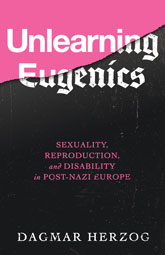(Source: UW Press)
University of Wisconsin press has published a
new book on reproductive rights and disability rights in postwar Europe.
ABOUT THE BOOK
Since the defeat of the Nazi Third Reich and
the end of its horrific eugenics policies, battles over the politics of life,
sex, and death have continued and evolved. Dagmar Herzog documents how
reproductive rights and disability rights, both latecomers to the postwar human
rights canon, came to be seen as competing—with unexpected consequences.
Bringing together the latest findings in
Holocaust studies, the history of religion, and the history of sexuality in
postwar—and now also postcommunist—Europe, Unlearning Eugenics shows how
central the controversies over sexuality, reproduction, and disability have
been to broader processes of secularization and religious renewal. Herzog also
restores to the historical record a revelatory array of activists: from
Catholic and Protestant theologians who defended abortion rights in the
1960s–70s to historians in the 1980s–90s who uncovered the long-suppressed
connections between the mass murder of the disabled and the Holocaust of
European Jewry; from feminists involved in the militant "cripple
movement" of the 1980s to lawyers working for right-wing NGOs in the
2000s; and from a handful of pioneers in the 1940s–60s committed to living in
intentional community with individuals with cognitive disability to present-day
disability self-advocates.
ABOUT THE
AUTHOR
Dagmar Herzog is a Distinguished Professor of
History and Daniel Rose Faculty Scholar at the Graduate Center, City University
of New York. Her many books include Cold War Freud: Psychoanalysis in an Age of
Catastrophes and Sexuality in Europe: A Twentieth-Century History.


No comments:
Post a Comment
Note: Only a member of this blog may post a comment.